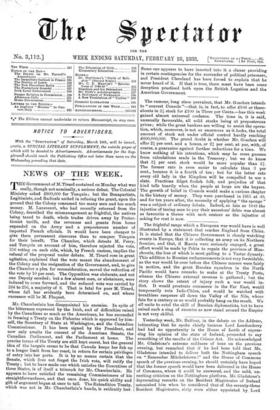Mr. Chamberlain has disappointed his enemies. In spite of the
bitterness expressed by the Irish, and of difficulties raised by the Canadians as much as the Americans, he has succeeded in framing a Treaty on the Fisheries which is approved by him- self, the Secretary of State at Washington, and the Canadian Commissioner. It has been signed by the President, and now only awaits the consent of the American Senate, the Canadian Parliament, and the Parliament at home. The precise terms of the Treaty are still kept secret, but the general idea of the bargain seems to be that Canada keeps her fish up to a longer limit from her coast, in return for certain privileges of entry into her ports. It is by no means certain that the Senate, which does not forget the Irish vote, will ratify the Treaty ; but to have made one which satisfies the Executives of three States, is of itself a triumph for Mr. Chamberlain. He appears to have satisfied the remaining Commissioners of his straightforwardness, and that once done, his quick ability and gift of argument began at once to telL The Extradition Treaty, which was not in Mr. Chamberlain's hands, is evidently lost.
Some one appears to have inserted into it a clause providing in certain contingencies for the surrender of political prisoners, and President Cleveland has been forced to explain that he never heard of it. If that is true, there must have been some deception practised both upon the British Legation and the American Government.


































